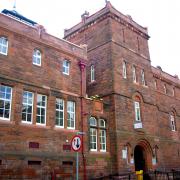
The Save Glenogle Baths campaign has delivered its last email update, and is to wind up shortly.
It has secured its aims of ensuring that the pool be conserved and maintained, and that the adjacent open space – 'the Snakey' – remain a public open space free from development.
In a gracious farewell, campaign Secretary Linda Wilson alliteratively thanked the committee, local councillors, City Council, contractors, Sport Scotland and Edinburgh Leisure, and the public.
'People power works,' she writes, 'and you helped us prove it'.
A celebratory drink will be had at the Stockbridge Tap on Thursday 29 July from 7.30pm onwards.
Wilson's confidence in 'people power' stems partly from an exemplary campaign which rescued Glenogle from what struck some observers saw as a foregone conclusion.
As an urban village, Stockbridge bears many similarities to Broughton, so it is worth reiterating some reasons why resistance here was so successful.
- Glenogle was a much loved institution, and its preservation appealed across social, income and immediate geographical distinctions. (Some argue that this appeal was more sentimental than logical, but no matter.)
- Campaigners early identified clear and achievable aims.
- Organisers could count on an articulate and reasonably affluent hardcore with sufficient time and personal resources to devote themselves to the work.
- They assiduously courted relevant media and heritage bodies, and distributed information packs where they would be most effective.
- They publicised their case and gathered contact details through public stalls (at, for instance, the Inverleith Tree Festival).
- Many activists already had experience of lobbying local politicians and were prepared to partner less experienced citizens in attending 53 councillors' surgeries and putting their case face to face.
- Support was informed and encouraged via regular emails and a website.
- The campaign enjoyed good fortune: it began gathering strength at a time of year when people were inclined to swim and were also likely to be outside in places where they could be contacted en masse.
- The campaign enjoyed good fortune: it began towards the start of a political cycle when politicians were keen to appear accountable and decisive, and could justify substantial public spending as 'prudential borrowing' before too many competing claims on limited finances were apparent.